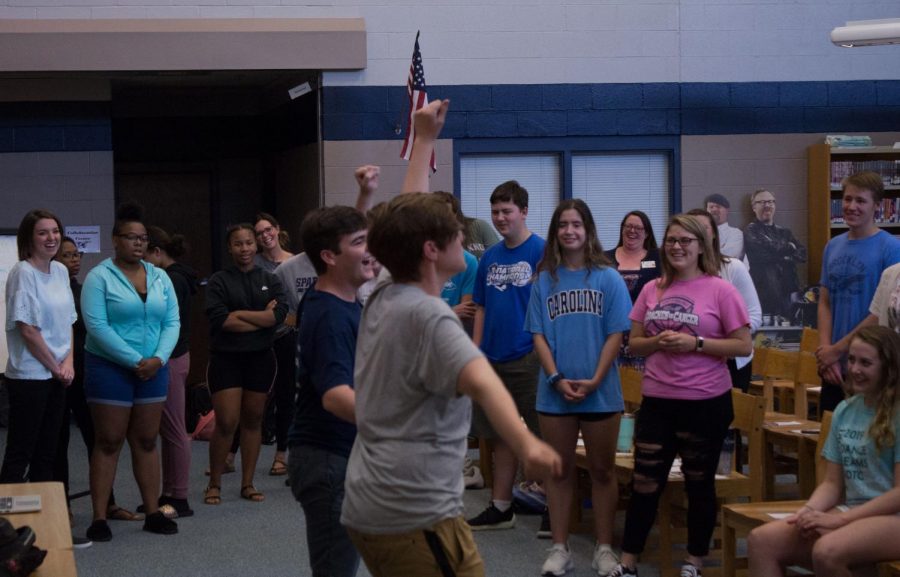Engineering an Environment of Equity
Equity training is laying the foundation for a more empathetic future by reducing prejudice and alienation at FHC.
October 3, 2019
The past is a brick. Whether it weighs you down or builds you up, it is a foundational piece to who you are. Race, sexual orientation, home life, fears, anxieties, and dreams are all bricks. While all of these things make us unique, they also divide us; just as a brick is used to raise a community, so can it be used to raise a wall. Brick by brick, connections–real connections, have become an extreme rarity. The fact of the matter is, as a school with slightly under 2000 students, Francis Howell Central’s hallways and classrooms are crowded with distant strangers.
To combat this problem, around 120 students and 20 faculty members underwent equity training. On September 10th, two sessions– one from first to third hour and another from fourth to seventh– were held in the learning commons. While a dictionary will lead you to believe that the three hour long sessions were merely a lesson on how to be fair and impartial, for sophomore Luke Cummings it was much more.
“The experience was very eye opening,” said Cummings, “I saw a lot of stuff that I’ve never thought about before, and things that I guarantee other people haven’t thought about before.”
Led by Trent Hall, a professional facilitator of dialogue, Cummings and his fellow classmates participated in various activities. A simple exercise geared towards breaking the ice was a favorite for Cummings.
“We went around high five-ing people and doing these little three minute gimmicks with each other, and just meeting new people. That’s what I really liked. I really liked how I just got to meet people I’ve never talked to,” Cummings said.
After feelings of comfort and general acquaintance were ubiquitous in the room, Hall prompted the students to dig deeper. Annika Clark, a senior, enjoyed one activity which visually demonstrated that despite differences, people can find solidarity.
“At one point we got in a line, and we all linked arms, and then [Hall] would ask us a question, and if that question applied to us, and we felt comfortable sharing it, we would take two steps out of the line, turn around and face the rest of the line. That way they could see who this question affected and the other people could see who’s out there with them, and I think that activity was a lot of fun, and it was really revealing,” Clark said.
English teacher Mrs. LaRue marveled at how, through other activities, such as defining their identity and conversing on diversity, the participants began to freely discuss topics that are otherwise avoided.
“This is not a topic that everybody loves talking about. It’s not like everybody’s like, ‘yeah, let’s talk about race! Let’s talk about sexual orientation! Let’s talk about the fact that there are challenges within our school within us as humans!’ and the fact that [the students] were so open and willing to do so was, it was very empowering,” LaRue said.
The focus of the sessions was to prepare the small group of students to go out and lead similar, community-fostering interactions.
“Unfortunately, there’s only so much our teachers can do. You know? there’s one of them for every 25 of us. And having student leaders who can reach out to students on an individualized basis every day and building that community of ‘I’m there for you, and you’re there for me,’ is really going to help our school and help the people within our school because then everyone’s gonna feel connected. And it’s just–it’s not gonna be just one teacher trying to look after all these students. It’s us looking out for each other,” Clark said.
Restorative circles, as they are called, are going to be implemented in classrooms across the building one seminar a month. By pulling from her own experiences, Mrs. LaRue, passionate and hopeful, is confident the circles will benefit Spartan Nation.
“[The equity training] has just definitely changed my perspective as a teacher, just this whole idea of giving everybody a fair chance, because they are all on their own life path. And what they’re seeing and what I’m seeing are different because we looking at it through a different lens,” said LaRue, “I really think that this is an important topic. And I think that anytime that we can get this topic sprinkled in our school, it’s going to make us a better school.”



